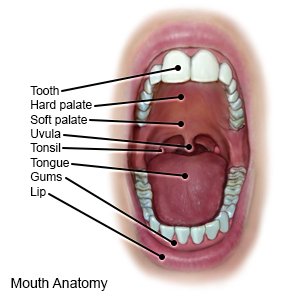Uvulopalatopharyngoplasty
Medically reviewed by Drugs.com. Last updated on Sep 23, 2025.
WHAT YOU NEED TO KNOW:
Uvulopalatopharyngoplasty (UPPP) is surgery to remove part or all of your uvula, soft palate, pharynx, or tonsils. Your soft palate is the back of the roof of your mouth. The uvula is the small piece of flesh that hangs at the back of your throat. The pharynx is your throat. UPPP may help you breathe easier, decrease snoring, and treat your sleep apnea.
 |
HOW TO PREPARE:
The week before your surgery:
- Arrange to have someone drive you home after surgery.
- Tell your surgeon about all medicines you currently take. He or she will tell you if you need to stop any medicine before surgery, and when to stop. He or she will tell you which medicines to take or not take on the day of surgery.
- Tell your surgeon about all your allergies. Include medicines, antibiotics, and anesthesia.
- You may need blood or urine tests before your surgery. You may also need x-rays, an EKG, or a pharyngoscopy. Talk to your healthcare provider about these or other tests you may need. Write down the date, time, and location for each test.
The night before your surgery:
You may be told not to eat or drink anything after midnight.
The day of your surgery:
- Take only the medicines your surgeon told you to take.
- Healthcare providers may insert an intravenous tube (IV) into your vein. A vein in the arm is usually chosen. You may be given liquids or medicine through the IV.
- An anesthesiologist will talk to you before your surgery. You may need medicine to keep you asleep or numb an area of your body during surgery. Tell healthcare providers if you or anyone in your family has had a problem with anesthesia in the past.
- You or a close family member will be asked to sign a legal document called a consent form. It gives healthcare providers permission to do the procedure or surgery. It also explains the problems that may happen, and your choices. Make sure all your questions are answered before you sign this form.
WHAT WILL HAPPEN:
What will happen:
General anesthesia will keep you asleep and free from pain during surgery. Medical tools will be used to hold your mouth open during the surgery. Your surgeon will use a laser to remove tissues that are blocking your throat. He or she may remove part or all of your uvula. He or she may remove your soft palate and tissues in your throat. Your tonsils and adenoids may also be removed. Your surgeon will watch for problems, such as bleeding. He or she may need to use stitches that absorb to stop the bleeding.
After your surgery:
You will be taken to a room to rest until you are fully awake. You will be monitored closely for any problems. Do not get out of bed until your healthcare provider says it is okay. You will then be able to go home or be taken to your hospital room.
CONTACT YOUR HEALTHCARE PROVIDER IF:
- You have a fever.
- You get a cold or the flu.
- You have questions or concerns about your surgery.
Risks
You may bleed more than expected or get an infection. The sound of your voice may change. You may lose your sense of taste temporarily. It may feel like there is a lump in your throat when you swallow. The laser may scar the inside of your throat. Your snoring or sleep apnea may not go away or may get worse. You may need another UPPP.
Related medications
Care Agreement
You have the right to help plan your care. Learn about your health condition and how it may be treated. Discuss treatment options with your healthcare providers to decide what care you want to receive. You always have the right to refuse treatment.© Copyright Merative 2025 Information is for End User's use only and may not be sold, redistributed or otherwise used for commercial purposes.
The above information is an educational aid only. It is not intended as medical advice for individual conditions or treatments. Talk to your doctor, nurse or pharmacist before following any medical regimen to see if it is safe and effective for you.
Learn more about Uvulopalatopharyngoplasty
Care guides
Further information
Always consult your healthcare provider to ensure the information displayed on this page applies to your personal circumstances.
